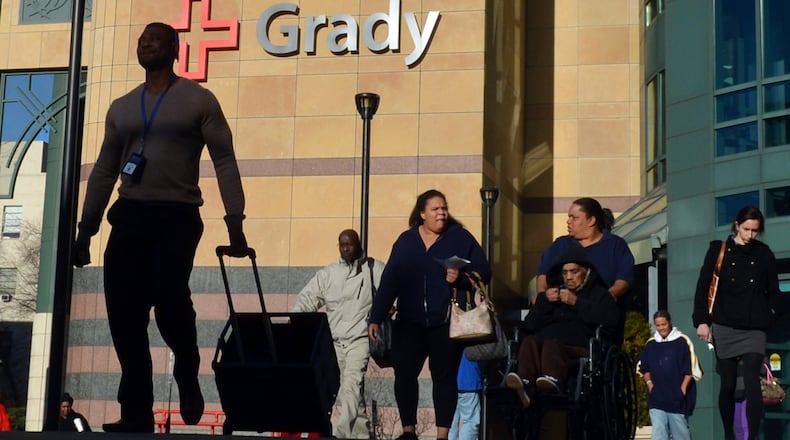Georgia’s web of safety-net hospitals could receive millions of dollars in a state bailout to replace a lucrative annual payment that’s being phased out in the wake of President Barack Obama’s signature health care law.
Gov. Nathan Deal said in an interview Thursday that he’s met with Grady Memorial Hospital’s leaders to discuss replacing federal subsidies that are due to be halved by the end of the decade. His office said other hospitals serving a large number of uninsured patients could also be included.
“We’re going to do what we can to try to help them in the short term,” Deal said.
The shortfall involves a little-known subsidy known as disproportionate share hospital payments. That funding is set to be cut in half over the next six years under the Affordable Care Act, whose sponsors assumed the hospitals would recoup the money with payments from patients covered by a Medicaid expansion also in the law.
But Georgia and many other Republican-led states have refused to broaden the government health care program for the poor out of concerns an expansion would be too costly, and Deal this week doubled-down on his stance by vowing to fight “any intrusion into our rights as a state.”
Safety-net hospitals across Georgia are now wrestling with the state over how to fill the gap. But the shortfalls pose a particularly devastating problem for Grady, the state’s biggest hospital, which stands to lose half of the roughly $90 million in subsidies it receives.
It comes as the hospital’s leadership is locked in another budget battle. The Fulton County Commission is considering whether to cut its funding for Grady’s operating budget from $50 million to $25 million. Commissioners are weighing the possibility of a property tax increase or another levy to fund the system, but state Republican lawmakers who last year voted in restrictions on property tax increases in the county are rumbling about a legal challenge.
Grady, which was once on the verge of closing its doors, now faces the prospect of watching its modest profits wiped out by the proposed cuts. Grady CEO John Haupert, who couldn’t be reached for comment Thursday, has warned such large cuts could lead to closed clinics and limited access to specialty care for some of metro Atlanta’s poorest residents.
One possibility may involve eliminating Grady’s mental health program, which loses an estimated $6 million to $8 million each year caring for 10,000 patients. In all, the hospital spends more than $200 million each year caring for the poor and uninsured.
“We’re not going to run this place into the ground,” Haupert said in a November interview. “We have to keep Grady viable. We have to keep it healthy.”
Deal’s critics say there’s a ready solution at hand. Expanding Medicaid would add an estimated 650,000 low-income Georgians to the program’s rolls and provide new revenue for Grady and other hospitals. Alan Essig of the left-leaning Georgia Budget & Policy Institute questions why the governor is considering using state money when federal funds are available.
“It doesn’t seem to make a lot of sense,” Essig said. “That (state money) could be used to further decrease the austerity cuts to education.”
For Deal, though, that idea is a nonstarter. His office estimates that expanding Medicaid would cost the state $4 billion over a decade, even with the federal government’s promise to pick up 90 percent of the tab after three years. He told lawmakers Wednesday that leaders “would not allow ourselves to be coerced into expansion.” Obamacare supporters say Deal’s estimate is overblown and the real cost to the state would likely be closer to half of that.
Now Deal’s office is exploring whether the bailout could come as a one-time payment or another source of funding. The governor’s top aide, Chris Riley, said a measure of flexibility was built into the governor’s $20.8 billion spending plan in case state funds are needed to plug the gap.
“It’s a constant discussion with hospitals in Georgia,” Riley said, adding: “We will be continuing to talk to Grady about what kind of assistance the hospital requires.”
Matthew Hicks, Grady’s vice president of government relations, said the hospital appreciates Deal’s “willingness to engage with us directly to discuss how to ensure Georgia’s safety-net hospitals remain strong during this period of significant change.”
Deal’s office said it was confident the hanging question wouldn’t complicate a legislative session that’s expected to end quicker than usual with elections looming. But state Sen. Vincent Fort, a Democrat whose district includes Grady, said he was skeptical.
Said Fort, “We’ll have to see how it shakes out.”
About the Author
Keep Reading
The Latest
Featured




